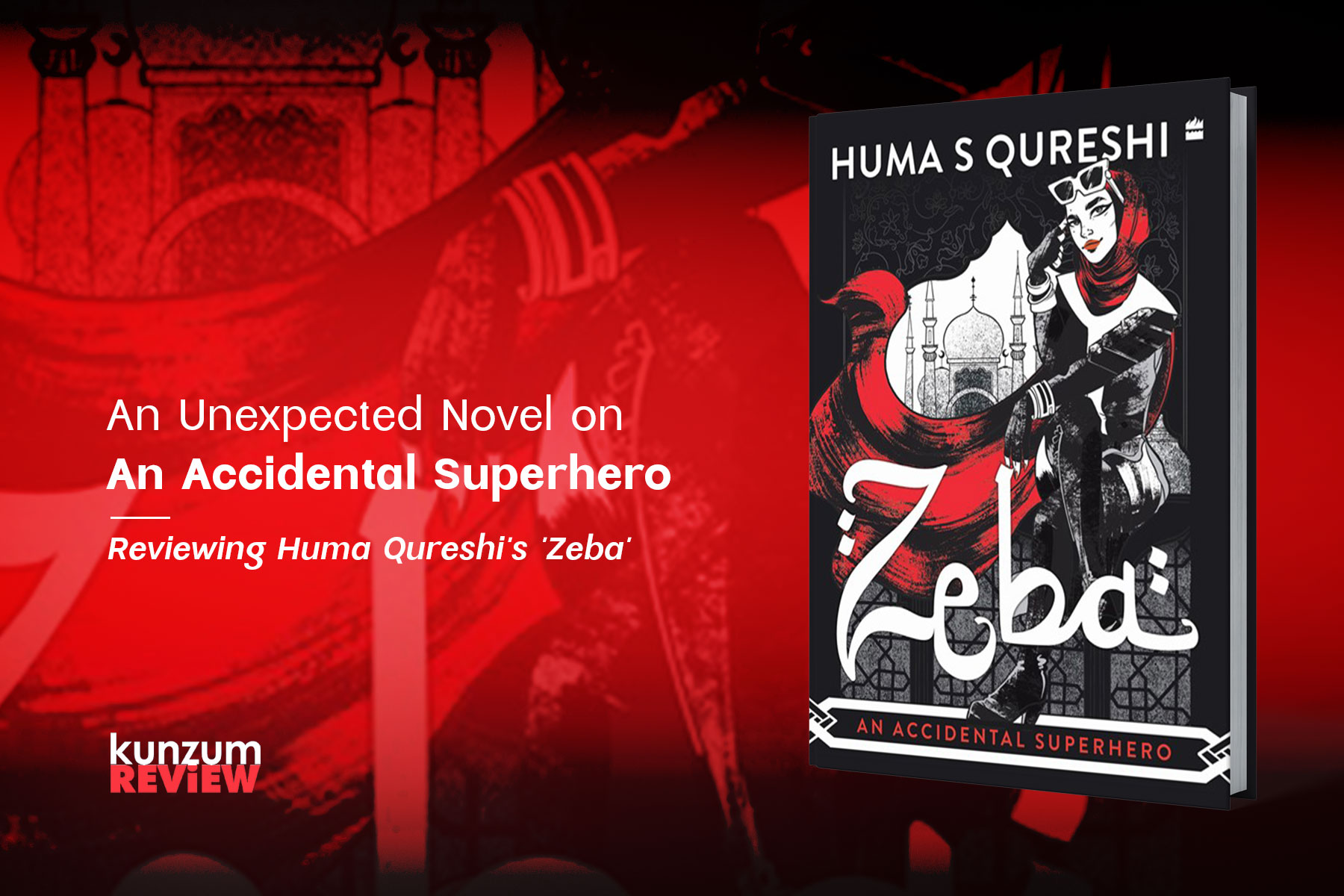
Critically acclaimed actress Huma Qureshi’s debut novel, Zeba: An Accidental Superhero, is an unexpected addition to South Asian fantasy literature. And that is exactly what captures the charm of this novel – its unabashed, brazen and uncensored unexpectedness.
Set in the fictional royal kingdom of Khudir, inserted betwixt the angled elbows of Pakistan, India, Afghanistan and China, it is imagined as being a small mountain kingdom, like Nepal, with Arab-like oil money and a fearsome despot at the helm. Khudir is, like the characters of the novel, an amalgamation of unlikely elements that beg for a suspension of disbelief. This dictatorial ruler, the Great Khan, multiply-botoxed and monstrously obese, possessing a wealth that rivals Ambani and an ambition for conquest that rivals Jafar’s, is the prime antagonist of the novel. And our protagonist? A character straight out of Sex-and-the-City New York, who spends her days being chauffeured around, smoking weed, popping edibles, and attending bi-weekly therapy sessions that explore the ennui of being born-wealthy and thus bereft of purpose. This is the story of Zeba, the unlikely superhero, and secret daughter of the Great Khan. This is the story of Zeba, who, submerged in ungodly luxury, is highly inconvenienced by her God-ordained ‘save-the-people’ fate.
But let’s not skip ahead to that. Let’s talk about these powers for a second.
Bad Man Khan’s neglected wife gave birth to a daughter who was too good to be a part of Mad Man Khan’s big-bad world. And so, as mothers do in dramatic stories involving ancient prophecies, evil kings and the historically accurate context of patriarchy, she ordered for her newborn daughter’s quiet execution. Shortly after, this little girl was promptly purloined and hastily taken away to Zsa Zsa, the revered mountain spring, for a good old-fashioned drowning. But God, as is his nature, had other plans. The baby, revived by the Divine Spirit, survived, and quietly floated down the spring into the lap of Ayesha, the Khan’s sister-in-law, a good woman in need of a daughter. This baby was named Zeba— ‘a heavenly miracle’. And her superpower? Water. Bending, boiling, freezing, sourcing, throwing and thawing – the whole nine yards of mystical ‘water-based’ abilities.
But wait, she hasn’t tapped in yet.
All was good for Zeba, who hated that someone tried to kill her but loved that she floated into an über-rich household that had just secured a permanent exiled residence in NYC. Knowing little of the circumstances of her birth, and caring even less about her ancestral culture, she leads a purposeless life of medical marijuana and taking random flights. All this changes when she is invited back to her homeland to attend a cousin’s wedding. In an attempt to reconcile with past traumas, her mother takes her to the spring from whence she came. And then, at the first instance of touching the sacred water, Zeba is struck by lightning and invested with divine powers that drive her to an even worse divine purpose — an epic battle with her evil father.
A quiet but obvious critique of duplicitous politicians and monstrous ambitions, it is also a celebration of brave women who step into history and write their narratives. Speaking to this celebration is Kherun, perhaps the most intriguing character in Qureshi’s novel, and also the royal hijra who was tasked with the royal infanticide. Recognising the historically pivotal role played by hijras in royal kingdoms and their fearful politics, Qureshi’s novel does the additional service of empowering her character with a voice and essential role in the text. It is her arc and evolution that binds the story together and facilitates its progression. While the novel is called ‘Zeba’, and declares itself as being her story specifically, the text gives ample opportunity to all of its characters and generously seats their unique streams of consciousness within its short pages. In being thus polyvocal and multi-faceted, the actor-turned-author saves her book from being stunted and limited.
A review of the novel would be incomplete without mentioning its unique attempt to house the immigrant narrative. Zeba, born in Khudir and raised in NYC, is a second-generation immigrant who takes the wrong God’s name in vain (it’s Allah, not Jesus). And so, in attempting to be a story about Zeba, the text is forced to straddle various paradoxical realms of the old and new. Here, deranged despots sit in hammams and dream of sushi, royal weddings are attended by Beyonce, and fit-bits sit at the wrists of those who wield ancient mystical powers of yore. Stretched between a frozen-in-time far-away space of the homeland and the tech-infused rapidly modernising realm of the foreign, the story entertains a duality that is fused throughout its elements—as is evidenced by the tacked-on side-notes and illustrated graphics that splice through the text and its characters’ expletive-heavy idiolects.
If you’re looking for an easy-to-read novel, featuring a bratty superhero who reluctantly battles the grotesque embodiment of everything misogynistic; or if you’re looking to read a fantasy novel replete with convoluted royal families, ancient secrets, mystical magic, dark powers and fearful wizardry; or even if you’re looking for a casual read featuring an off-beat character who hopes to sleep around, spend money and smoke weed, but is now forced to save-the-world, uncover traumatic family secrets, and protect an ancient kingdom– then Qureshi’s Zeba might just be your cup of tea.
Pick up Huma S Qureshi’s Zeba: An Accidental Superhero from any Kunzum store or WhatsApp +91.8800200280 to order. Buy the book(s) and the coffee’s on us.
